What drives a person to become an anti-abortion activist?
In their own words, pro-life campaigners talk to Emily Goddard, offering a rare glimpse into the motives behind the movement
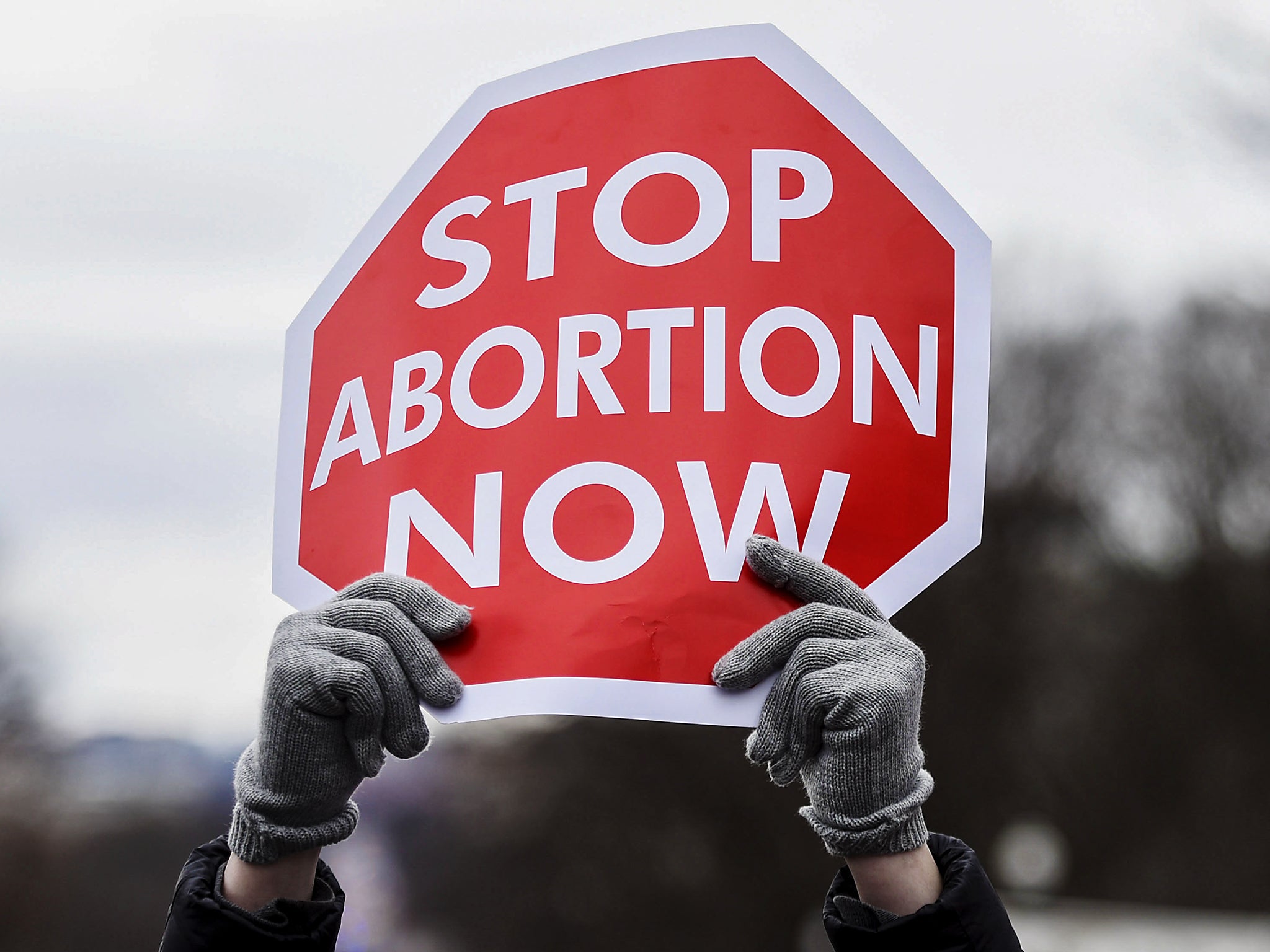
“God got me involved, God called me up to London,” Elizabeth explains as she stands in front of the Department of Health’s Westminster headquarters. Only this time it is not the building’s asymmetrical honey-hued front that catches the eye; instead it is the blown-up photo of a 24-week-old aborted foetus, a graphic image that does not censor the bloody reality of late-term pregnancy termination.
The 49-year-old housewife is here, along with a number of other men and women, to campaign against abortion. But why, when women in England, Wales and Scotland have had the legal right to access the procedure on a wide number of grounds since the Abortion Act 1967? And what is it that motivates so-called pro-lifers to become active to try to bring about change in law and society?
“I don’t think I’ve ever not been pro-life, I’ve always had the opinion that life is precious and should be preserved,” Elizabeth says. “It was never a choice that I turned from [pro-choice] to [anti-abortion]. I’m a Christian and God got me involved.” She is one of a number of people who feel compelled to regularly protest against abortion with religion as their driving force in the face of criticism, and alleged abuse and violence (I witnessed passers-by swearing and shouting at the demonstrators).
Many people outside of the pro-life movement assume those who are active within it must be at the very least religious and most likely Catholic, because the Catholic Church opposes all forms of abortion procedures from the moment of conception. Certainly a number of anti-abortion groups in the UK – such as the Good Counsel Network and Helpers of God’s Precious Infants – are explicitly Catholic organisations that hold regular prayer vigils outside abortion clinics.
Another campaigner Nicky, 54, decided she was pro-life when she was 40; like Elizabeth, she cites religion as her motivation. However, it was not until a friend opted to have an abortion that she confronted the issue fully for the first time; before then, she says, it didn’t come up.
“I found out that we were losing 800 human lives per working day in this country to abortion,” she recalls. “It galvanised me to try to help as many more women as I could, and try to save as many more little lives as I could.
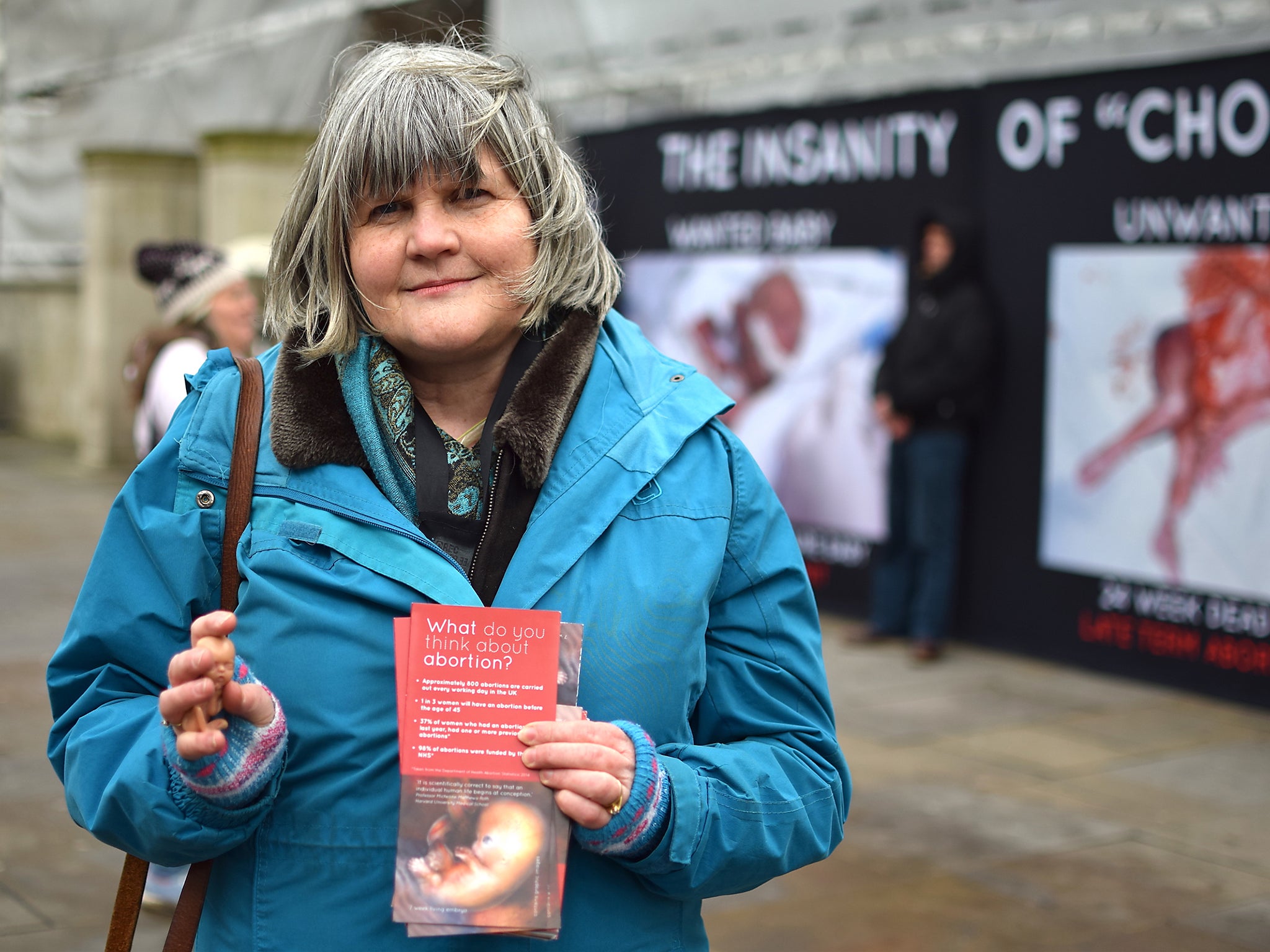
“But what made me actually take that step? In all honesty, I am a born-again Christian. I love Jesus very, very much. And I said to God: ‘well, do you want me to get involved with this work?’ And he said to me: ‘I should not have to tell you to do, what is recorded in my word to do’. And so for me I see 800 little lives, in today’s country, a tiny country of the UK, that will be brutally torn out of the womb. And I just can’t stand by and let that happen. I have to try to do something.”
Nicky’s friend went ahead with the abortion, despite her attempts to discourage her. They remain friends today.
Another anti-abortion campaigner, Ben, 39, who is a junior minister in a church in west London, quotes from the bible to explain why he campaigns: “The bible says, 'Beautiful are the feet of him who brings good news’. Now that’s with specific reference to the Gospel, the saving Gospel of Jesus Christ, but also in many other ways people can be the bearers of news and information and dialogue which educates and which can raise people’s understanding and therefore their understanding of their fellow human beings, their understanding of the big issues rather than remaining in our particular subjective view of the world.”
Ben insists he is not a dogmatic, anti-abortionist crusading for an end to the law, although he does concede some pro-life activism can be “in your face”. His story is interesting as he explains how he underwent a transition from being somewhat pro-choice in his youth to now believing that “it’s best for women to not have abortions”.
“I’ve been a Christian for about the past 25 years, and as I’ve grown in my faith and understanding of Christianity, that has heavily influenced my position vis-à-vis pro-life,” Ben explains. “Also, being engaged in Christian ministry, having met a number of folks who’ve experienced the trauma of abortion, I believe abortion is far more traumatic than [going through with an unplanned pregnancy] to a woman later in life reflecting back on the choice she’s made. That’s more of an issue for women going forward in their quality of life, in their understanding of who they are, in their relating to other people and so forth in a variety of ways.”
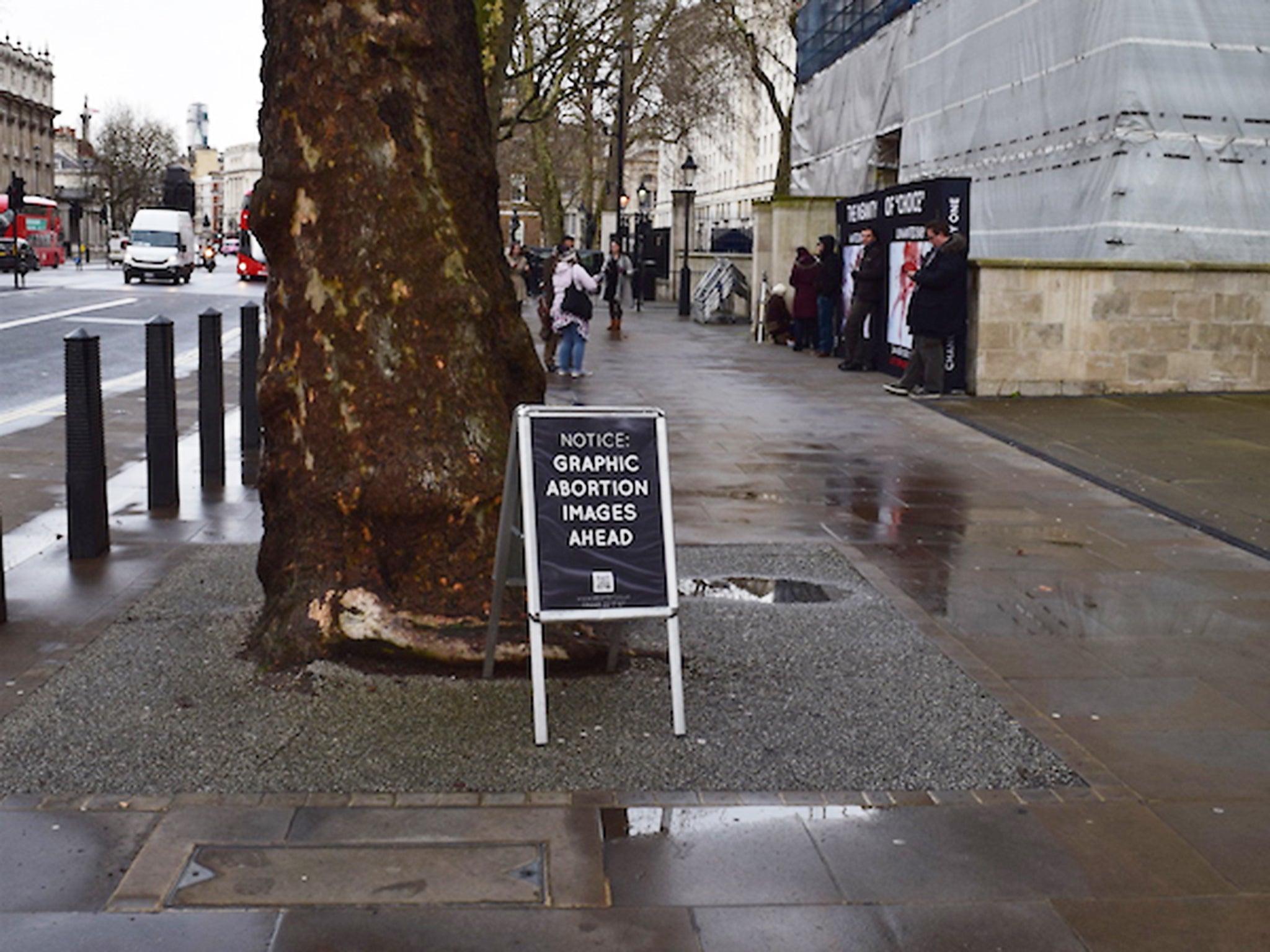
Ben, it seems, is not alone in having previously had ambivalent views on abortion before over time forming the opinion that it is wrong. Peter Williams is executive officer of pro-life organisation Right to Life and says he comes from a place of believing choice was of utmost significance until he saw an image of an aborted foetus.
“I was pro-choice because I was very libertarian, still am very libertarian, but fundamentally I believed that choice was the most important thing and maximising choice was also the most important thing when it comes to political matters so [it was a] very classical liberal approach that I took there,” he says.
“I would still describe myself as libertarian, but what I didn’t realise was the humanity of the unborn child. I was only thinking in terms of the choice of women to have an abortion, to not have an abortion, and then when I was confronted with the picture of an aborted foetus, it made me realise actually I hadn’t considered properly the humanity of the unborn child.
“So when I did do that and I did research, I found that no, actually, this is a member of the human family. This isn’t just a bunch of cells. We’re all bunches of cells in some way. This is actually a unique bunch of cells that we call a human being. Because I believe every human being has the right to life, I believe that the unborn child has the right to life and that’s what changed my mind. ”
It was also an image that changed things for another campaigner, Les, who was triggered to become not only a pro-life activist but also a Christian. At a prayer vigil outside a Marie Stopes clinic in London, he tells his story, which he says sometimes makes him “get a bit emotional”.
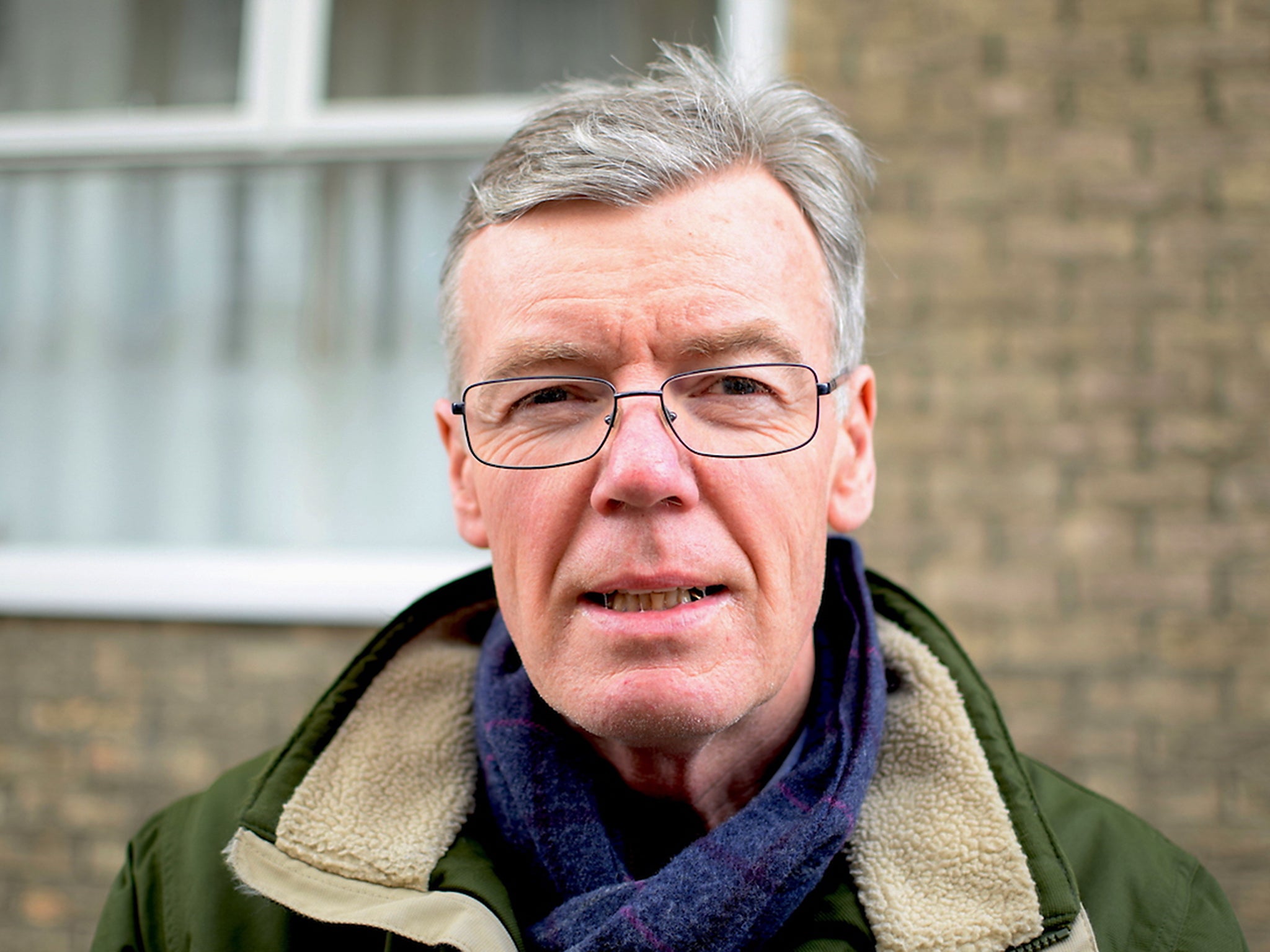
“It was 1997, which was the 30th anniversary of the Abortion Act,” he recalls. “There was a walk along the Thames led by some of the church leaders, Cardinal Hume was one of them, and it was on the news [on TV]. I was just sitting there watching it and his face was so sad. They were dropping in the Thames red roses, representing the unborn children, lost before birth, killed by abortion. That image touched my heart. I wasn’t particularly a churchgoer or even religious so I didn’t really have a particular view on abortion, it wasn’t an issue I was concerned with. But from that moment I thought, ‘well, who do I know of that’s anti-abortion?’ I suddenly thought of Mother Teresa and started reading her books. She turned me into a Christian and I’m now a pro-life Christian. All Christians should be pro-life.”
But religion is not always the sole reason behind campaigning in the movement. For instance, Abort67, “a public education project that seeks to change how we view abortion”, operates as a human rights organisation, with no specific religious motivation. Ruth Rawlins, the London coordinator for Abort67, says she was already pro-life but knew she had to get involved in some way. “I knew I wanted to do something to end this injustice that is going on in our nation so I came across the group and it made sense,” she says. “They say first of all you can’t end an injustice until you first expose it. As long as an injustice is covered up and hidden, no one will be bothered enough to work to make a difference.”
Equally, campaigner Lesley, 52, says she became part of the pro-life movement because she had to take “a holistic view of respect for life” as she is also part of the Campaign for Nuclear Disarmament and animal rights groups – and not on religious grounds. She says she has faced some difficulty in working with particular groups because she is a non-religious pro-lifer and campaigning to give a voice to “the smallest, weakest and most vulnerable of the human community”.
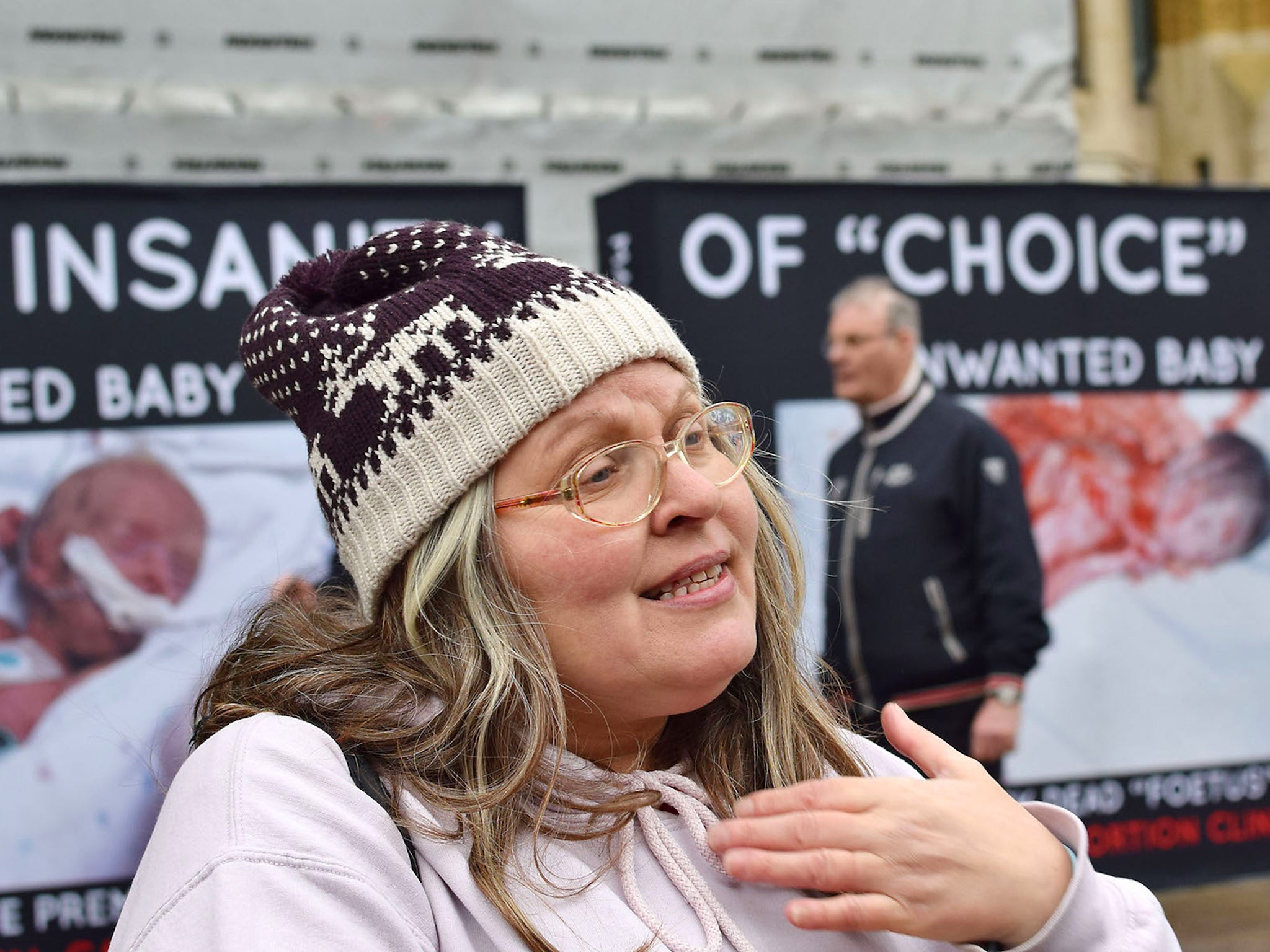
Sometimes it is the first-hand experience of abortion itself that drives people to campaign against it. Pauline Peachey, 71, had an abortion after having her first child, and is now pro-life and the founder of Post Abortion Support For Everyone, which aims to help people who have gone through the procedure. Doctors recommended she have an abortion after being diagnosed with German measles at just less than 12 weeks of pregnancy. She insists she never wanted the abortion, but was encouraged by the doctors to go ahead.
“I wasn’t really with it, you know, I was very distressed and withdrawn,” she says. “I really didn’t want an abortion but I was afraid.” She remembers a doctor told her she was the kind of case for which the Abortion Act was passed. This experience, which she describes as “hell”, forced her to get involved in the pro-life movement because she knew she “must do something”.
Another anti-abortion campaigner to have been touched by the procedure is Steve. The 46-year-old teacher says he joined the pro-life movement after witnessing the downfall of a close friend following an abortion. “She had an abortion at a young age and I know how badly that affected her,” he explains while protesting in front of the DoH. “Essentially, it ruined her life. I witnessed that and it was very unpleasant.”
Meanwhile, Ryan Bomberger says he became a key figure in the pro-life movement as he says he no longer wants to be the reason people call on to justify abortion. He found out at the age of 13 that he was conceived in a rape. His mother went ahead with the pregnancy, and he was born and adopted in 1971. He has since co-founded the Radiance Foundation with his wife in 2009 and shares his story with people around the world.
“Less than 1 per cent of the 1.2 million abortions every year are due to rape,” he says. “I’m the 1 per cent that is used all the time to justify 100 per cent of abortions. When do we ever define an innocent child by the crimes of either parent? This is only necessary to those whose ideology demands the dehumanisation of that life to justify killing via abortion.
“My biological mother was raped in 1970. Despite her pain, she chose life. She made a selfless, courageous decision so that I can love and be loved, by my beautiful wife and our four kids. Words cannot express how grateful I am to my birth mom and her self-sacrifice or to my loving parents who poured their lives and their love into their 13 children, 10 adopted children. So I share my story, I share the stories of others because the reality is that for every one baby that’s adopted, there are 64 aborted.” Ryan has been searching for his biological mother but has yet to find her.
There are also the people that have been in contact with the pro-life movement since birth and follow in their parents’ footsteps to become activists. Among them is Rhoslyn Thomas, who is the youth and education officer at the Society for the Protection of Unborn Children (SPUC), but has also worked with 40 Days for Life and the Good Counsel Network. Her parents run a SPUC branch and have been involved in the pro-life movement for about 30 years; her mother also works at SPUC part-time.
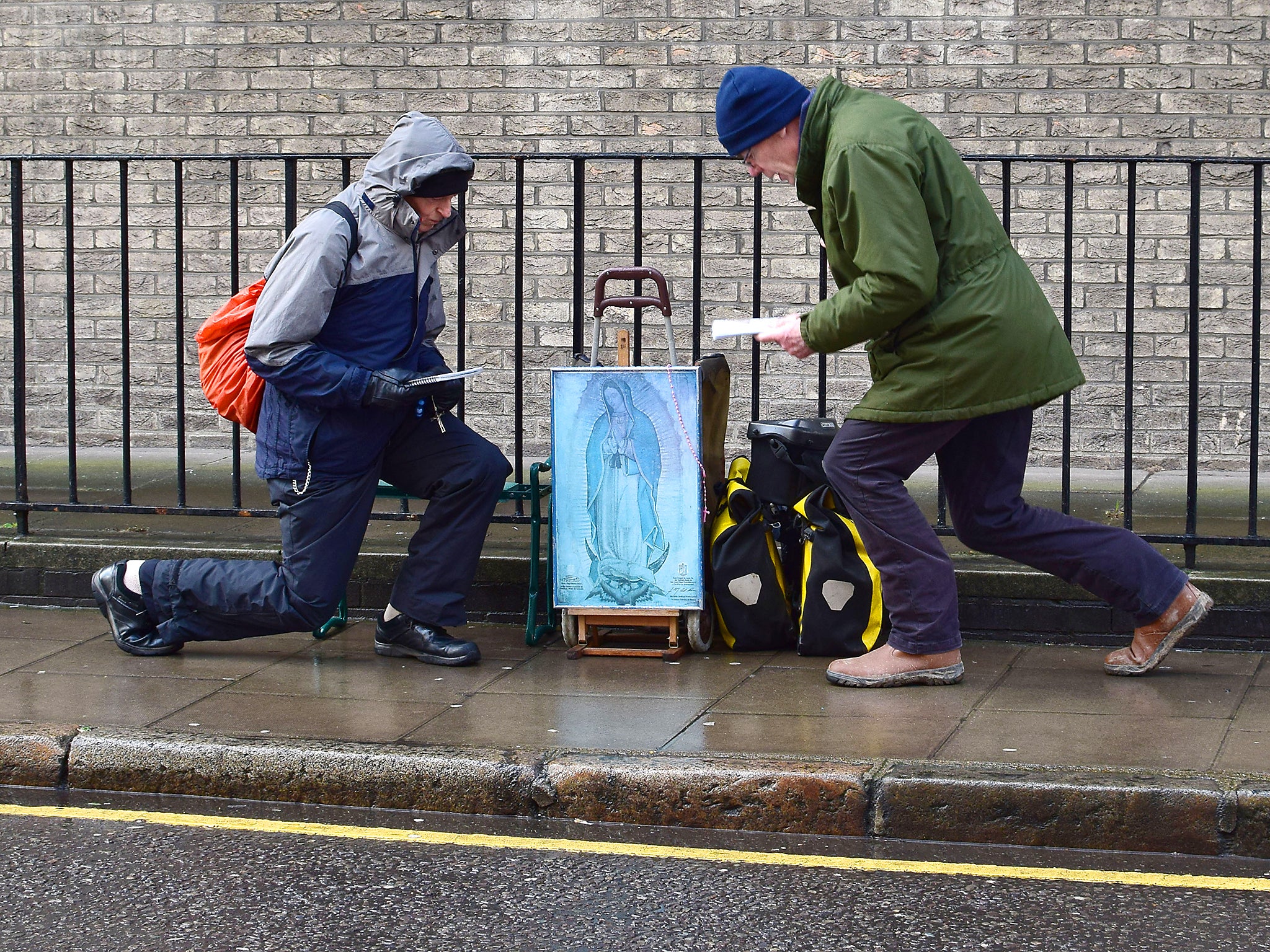
She says she never expected to work full-time in the pro-life movement, but always knew should would at least volunteer. “We are a very, very pro-life family, ” she explains. “Pro-life activism was just a normal part of our everyday life and I’m really thankful to my mum and dad for always talking to us about it. Because there was so much pressure to go the other way, I think if they hadn’t I probably wouldn’t be pro-life as I just wanted to be normal and fit in like everybody else. When I was quite young, maybe 11 or 12, other people – because of their upbringing, because of the influence of society – couldn't understand why I was against abortion.”
“Even when I was quite young, there was probably never a day that went past when we didn’t discuss pro-life issues,” Rhoslyn adds. “I’m really thankful to them [her parents] for doing that and for also never hiding the truth from me. I always knew what was involved in an abortion. I knew all the facts. I think some people hide it from their children because they think their children can’t handle it. But I remember when I was really quite little, seeing pictures of aborted babies. And I think that’s what kept me pro-life, because I couldn’t forget those images.”
Rhoslyn says the pressure to be pro-choice at university also cemented her views on abortion. She remembers vividly being “very angry” when a teacher at university did a lecture on abortion. The tutor said intact dilation and extraction, otherwise known as partial birth abortion, “was not as bad as it sounds”. “[Partial birth abortion] is where the baby is almost completely born and then they literally will suck out the brains and crush the head and that’s how they abort the baby at a very, very late term, ” she says. “She [the tutor] said that it was not as bad as it sounds. It was just disgusting. When I challenged her on that by email, in a very polite way a couple of weeks later, she took it to the head of the department. I said, ‘fine, take it to the head of the department, I don’t care, you’re in the wrong’. And the head of department was basically trying to quieten it all down. She left a year later so I don’t know what happened to her.”
While there are evidently numerous and varied reasons why people choose to become pro-life activists, the movement is likely to be propelled and strengthened in the wake of Donald Trump’s reinstatement in January of the “global gag rule”, which bans international NGOs with US funding from providing abortions or offering information. And if religion remains a key driver, that too could boost numbers as the growth of the Catholic Church outpaces that of the general population – according to the Vatican, the former grew by 17.8 per cent over the past nine years, compared with 17.3 per cent for the latter. It will be interesting to see where the next generation of campaigners comes from and what will drive them to carry on the work being done today.
Join our commenting forum
Join thought-provoking conversations, follow other Independent readers and see their replies
Comments